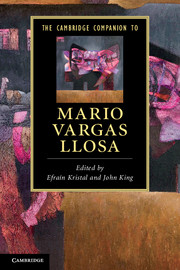Book contents
- Frontmatter
- Introduction
- 1 Reality and rebellion: An overview of Mario Vargas Llosa’s literary themes
- 2 The early novels: The Time of the Hero and The Green House
- 3 The total novel and the novella: Conversation in The Cathedral and The Cubs
- 4 Humour and irony: Captain Pantoja and the Special Service and Aunt Julia and the Scriptwriter
- 5 The historical novel: The War of the End of the World
- 6 Innocence and corruption: Who Killed Palomino Molero? and The Storyteller
- 7 The political novels: The Real Life of Alejandro Mayta and Death in the Andes
- 8 The erotic novels: In Praise of the Stepmother and The Notebooks of Don Rigoberto
- 9 The dictator novel: The Feast of the Goat
- 10 From utopia to reconciliation: The Way to Paradise, The Bad Girl and The Dream of the Celt
- 11 The essays
- 12 The memoir: A Fish in the Water
- 13 The plays
- 14 Film and the novels
- 15 An interview
- Further reading
- General index
- Index of selected fictional characters
- Index of selected works by Vargas Llosa
4 - Humour and irony: Captain Pantoja and the Special Service and Aunt Julia and the Scriptwriter
Published online by Cambridge University Press: 28 January 2012
- Frontmatter
- Introduction
- 1 Reality and rebellion: An overview of Mario Vargas Llosa’s literary themes
- 2 The early novels: The Time of the Hero and The Green House
- 3 The total novel and the novella: Conversation in The Cathedral and The Cubs
- 4 Humour and irony: Captain Pantoja and the Special Service and Aunt Julia and the Scriptwriter
- 5 The historical novel: The War of the End of the World
- 6 Innocence and corruption: Who Killed Palomino Molero? and The Storyteller
- 7 The political novels: The Real Life of Alejandro Mayta and Death in the Andes
- 8 The erotic novels: In Praise of the Stepmother and The Notebooks of Don Rigoberto
- 9 The dictator novel: The Feast of the Goat
- 10 From utopia to reconciliation: The Way to Paradise, The Bad Girl and The Dream of the Celt
- 11 The essays
- 12 The memoir: A Fish in the Water
- 13 The plays
- 14 Film and the novels
- 15 An interview
- Further reading
- General index
- Index of selected fictional characters
- Index of selected works by Vargas Llosa
Summary
As critics have noted, in the early 1970s Mario Vargas Llosa was a man in transition from one set of political beliefs to another, but he was also a novelist in search of a new complexity, and he found it for a while in a genre that was not his first choice: comedy. His achievements in Captain Pantoja and the Special Service (Pantaleón y las visitadoras, 1973) and Aunt Julia and the Scriptwriter (La tía Julia y el escribidor, 1977) are all the more remarkable because the writer was, in several respects, turning away from what he knew. At the same time he was anxious not to be disloyal to his past, and in comedy he discovered a means of expressing certain truths that continued to lurk in realms of encroaching falsehood. Captain Pantoja reminds us of the closeness of mania to certain kinds of virtue; and Aunt Julia and the Scriptwriter ironically celebrates an art that escapes madness, but only just.
In a 1999 prologue to Captain Pantoja and the Special Service, Vargas Llosa tells us that the novel is based ‘on a fact’, ‘a real event … that I got to know well during two trips to the Amazon’, and that his early drafts were very different in tone from the final, and quite wonderful result. ‘As incredible as it seems … in the beginning I tried to tell this story seriously. I discovered that was impossible, that the story demanded farce and laughter’.
- Type
- Chapter
- Information
- The Cambridge Companion to Mario Vargas Llosa , pp. 49 - 61Publisher: Cambridge University PressPrint publication year: 2011

